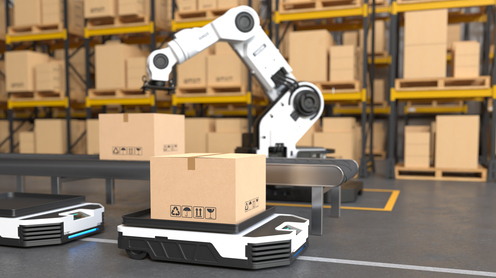Conquering the Supply Chain with Machine Learning
3AI June 28, 2023

Featured Article:
Author: Arpit Vijaywargia, AB InBev
Supply chain is the process of managing the flow of goods, it’s an important process that involves the coordination of various stakeholders including suppliers, manufacturers, distributors, retailers and used goods. It is an essential part of business operations, and good supply chain management can help organizations increase efficiency, reduce costs, increase customer satisfaction and gain competitive advantage. However, some challenges may arise in the supply chain, such as demand forecasting, product optimization, inventory management and route development, technology, logistics management and SKU (Stock Keeping Unit) development. In recent years, machine learning (ML) has emerged as a powerful tool that can help organizations meet these challenges by analyzing big data and analyzing standards and insights that can improve performance and productivity. This article explores ways machine learning can help organizations tackle their supply chains and future technologies that can improve supply chain management.
“The supply chain is like a competitive sport, and those who have the best players, and the best strategies are the ones who come out on top.” – Thomas L. Freese

Supply Chain Challenges
- Demand Forecasting: One of the most important challenges in the supply chain is accurately forecasting customer demand. Failure to meet demand can result in product breakdown or recall, resulting in lost sales and increased costs.
- Warehouse optimization: Warehouse operations can be difficult and time consuming. It can be difficult for companies to find products or take a long time to fulfill orders. This can lead to customer dissatisfaction, lost sales and increased costs
- Inventory optimization and management: Inventory management is critical to supply chain efficiency. Companies may struggle to find the right balance between too much inventory and too little inventory. Overstocking can lead to increased carrying costs, while understocking
can lead to lost sales and dissatisfied customers.
- Route optimization and logistics management: Logistics is a complex and time-consuming process. Companies may struggle to find the most efficient routes or modes of transportation. This can lead to increased shipping costs, delivery delays and customer dissatisfaction.
- SKU (Stock Keeping Unit) Growth: Companies may have trouble managing a large number of SKUs, which can lead to increased inventory costs and inefficiencies
Machine Learning (ML)
Machine learning is a subfield of artificial intelligence that involves developing algorithms and models that can learn from data and make predictions or decisions. In the context of the supply chain, machine learning can analyze big data and identify patterns and insights that can help improve operations and increase profitability.
How ML Can Help Overcome Supply Chain Challenges
- Demand Forecast:
ML provides forecasted sales data, market trends, and more.
Ability to accurately predict customer needs. Measuring real demand can help companies improve product quality, reduce inventory, and avoid excessive inventory costs.

- Warehouse Optimization:
ML can help improve warehouse operations by analyzing data such as order volume, product speed, and storage capacity. This helps reduce warehouse costs, increase efficiency and improve order accuracy


- Inventory Optimization and Management:
Inventory management is crucial to supply chain quality. Machine learning can analyze inventory levels, demand patterns and product risks to improve product levels and reduce waste. This can help companies reduce shipping costs, increase order speed and increase revenue.
- Route optimization and logistics management:
Logistics is a complex and time-consuming task. Machine learning can improve delivery methods, delivery methods and lead times to reduce costs and increase efficiency. This can help companies reduce shipping costs, increase on-time delivery rates, and increase customer satisfaction.

- SKU (stock keeping unit) proliferation:
Machine learning can analyze sales data and demand patterns to identify unprofitable or
consolidated SKUs. This can help companies reduce shipping costs, improve production time and increase revenue. Using machine learning, companies can identify low-demand
products and focus on producing high-demand products which
can help them reduce waste and create good impact.

- Predictive Maintenance: ML algorithms can be used to analyze data on equipment performance and identify potential maintenance issues before they become serious problems. This can help organizations to reduce downtime and maintenance costs.
- Pricing Optimization: ML algorithms can help organizations optimize pricing by analyzing data on market trends, customer behavior, and competitor pricing strategies. This can help organizations to price products competitively and maximize profits.
And many more….
Future Technologies in the Supply Chain
Besides machine learning, there are several other future technologies that can help tackle supply chain challenges:
- Internet of Things (IoT): IoT technology can help connect devices and sensors throughout the supply chain by providing real-time information on everything from inventory to delivery. This can help improve supply chain visibility and make better decisions
- Generative Artificial Intelligence (GAI): Generative AI can help supply chains in many ways. By analyzing large amounts of historical data, AI tools can identify patterns and relationships that can improve the accuracy of demand forecasting, improve product levels and reduce waste products. It can also help identify areas for process improvement and increase the efficiency of supply chain operations.
- Blockchain: Blockchain technology can help ensure transparency and traceability in the supply chain by providing secure, distributed information for all transactions.
This will help reduce the risk of fraud and fraud and increase the overall efficiency of electronic products
- Robotics and Automation: Robotics and automation technologies can help automate a variety of supply chain processes such as order picking, packaging, and shipping. This helps reduce operating costs and increase overall energy efficiency
Conclusion
Supply chain is an essential part of business and optimization is crucial to competition. Machine learning is a powerful tool that can help companies overcome supply chain challenges by providing insight and efficiency. Using machine learning, companies can improve forecast accuracy, improve supply chain visibility, improve product quality, monitor product performance and promote sustainability. So, companies can increase efficiency, reduce costs and increase customer satisfaction.
“Disclaimer – This is the personal view of the author based on the experience while working with AB INBEV GCC and hereby shared for your reference only. No Warranties, Promises and/or representation of any kind, expressed or implied, are given as to the nature, standard, accuracy or otherwise of the information provided in this article nor to the suitability or otherwise of the information to your particular circumstances.
GCC or ABI have no control on the contents of this article and shall not be liable for any loss or damage of whatever nature (direct, indirect, consequential or other) whether arising in contract, tort or otherwise, which may arise as a result from your use of the information in this article and will not accept responsibility for the accuracy of this article.”
Title picture: freepik.com






